- Home
- Jerry Spinelli
Stargirl Page 3
Stargirl Read online
Page 3
After dinner that day, Kevin and I walked over to Archie’s. Though the official class convened on Saturday morning, kids were welcome anytime. “My school,” he said, “is everywhere and always in session.”
We found him, as usual, on the back porch, rocking and reading. The porch, bathed in the red-gold light of sunset, faced the Maricopas. Archie’s white hair seemed to give off a light of its own.
The moment he saw us, he put down his book. “Students! Welcome!”
“Archie,” we said, then turned to greet the great cactus, as visitors were expected to do: “Señor Saguaro.” We saluted.
We sat on rockers; the porch was full of them. “So, men,” he said, “business or pleasure?”
“Bafflement,” I said. “There’s a new girl in school.”
He laughed. “Stargirl.”
Kevin’s eyes popped. “You know her?”
“Know her?” he said. He picked up his pipe and loaded it with cherrysweet tobacco. He always did this when settling in for a long lecture or conversation. “Good question.” He lit the pipe. “Let’s say she’s been on the porch here quite a few times.” White smoke puffed like Apache signals from the corner of his mouth. “I was wondering when you’d start asking questions.” He chuckled to himself. “Bafflement… good word. She is different, isn’t she?”
Kevin and I burst into laughter and nods. At that moment I realized how much I had been craving Archie’s confirmation.
Kevin exclaimed, “Like another species!”
Archie cocked his head, as if he had just caught the sound of a rare bird. The pipe stem anchored a wry grin. A sweet scent filled the air about our rocking chairs. He stared at Kevin. “On the contrary, she is one of us. Most decidedly. She is us more than we are us. She is, I think, who we really are. Or were.”
Archie talked that way sometimes, in riddles. We didn’t always know what he was saying, but our ears didn’t much care. We just wanted to hear more. As the sun dipped below the mountains, it fired a final dart at Archie’s flashing eyebrows.
“She’s homeschooled, you know. Her mother brought her to me. I guess she wanted a break from playing teacher. One day a week. Four, five—yes, five years now.”
Kevin pointed. “You created her!”
Archie smiled, puffed. “No, that was done long before me.”
“Some people are saying she’s some kind of alien sent down here from Alpha Centauri or something,” said Kevin. He chuckled, but not too convincingly. He half believed it.
Archie’s pipe had gone out. He relit it. “She’s anything but. She’s an earthling if there ever was one.”
“So it’s not just an act?” said Kevin.
“An act? No. If anybody is acting, it’s us. She’s as real as”—he looked around; he picked up the tiny, wedgelike skull of Barney, a 60-million-year-old Paleocene rodent, and held it up—“as real as Barney.”
I felt a little jolt of pride at having reached this conclusion myself.
“But the name,” said Kevin, leaning forward. “Is it real?”
“The name?” Archie shrugged. “Every name is real. That’s the nature of names. When she first showed up, she called herself Pocket Mouse. Then Mudpie. Then—what?—Hullygully, I believe. Now…”
“Stargirl.” The word came out whispery; my throat was dry.
Archie looked at me. “Whatever strikes her fancy. Maybe that’s how names ought to be, heh? Why be stuck with just one your whole life?”
“What about her parents?” said Kevin.
“What about them?”
“What do they think?”
Archie shrugged. “I guess they agree.”
“What do they do?” Kevin said.
“Breathe. Eat. Clip their toenails.”
Kevin laughed. “You know what I mean. Where do they work?”
“Mrs. Caraway, until a few months ago, was Stargirl’s teacher. I understand she also makes costumes for movies.”
Kevin poked me. “The crazy clothes!”
“Her father, Charles, works”—he smiled at us—“where else?”
“MicaTronics,” we said in chorus.
I said it with wonder, for I had imagined something more exotic.
Kevin said, “So where is she from?”
A natural question in a city as young as Mica. Nearly everybody had been born somewhere else.
Archie’s eyebrows went up. “Good question.” He took a long pull on the pipe. “Some would say Minnesota, but in her case…” He let out the smoke, his face disappearing in a gray cloud. A sweet haze veiled the sunset: cherries roasting in the Maricopas. He whispered, “Rara avis.”
“Archie,” said Kevin, “you’re not making a lot of sense.”
Archie laughed, “Do I ever?”
Kevin jumped up. “I want to put her on Hot Seat. Dorko Borlock here doesn’t want to.”
Archie studied me through the smoke. I thought I saw approval, but when he spoke, he merely said, “Work it out, men.”
We talked until dark. We said “adiós” to Señor Saguaro. On our way out, Archie said, more to me than to Kevin, I thought: “You’ll know her more by your questions than by her answers. Keep looking at her long enough. One day you might see someone you know.”
8
The change began around Thanksgiving. By December first, Stargirl Caraway had become the most popular person in school.
How did it happen?
Was it the cheerleading?
The last football game of the season was her first as a cheerleader. The grandstand was packed: students, parents, alumni. Never had so many people come to a football game to see a cheerleader.
She did all the regular cheers and routines. And more. In fact, she never stopped cheering. While the other girls were taking breaks, she went on jumping and yelling. She roamed. Areas that had always been ignored—the far ends of the grandstand, the spectators behind the goalposts, the snack bar parents—found themselves with their own arm-pumping cheerleader.
She ran straight across the fifty-yard line and joined the other team’s cheerleaders. We laughed as they stood there with their mouths open. She cheered in front of the players’ bench and was shooed away by a coach. At halftime she played her ukulele with the band.
In the second half she got acrobatic. She did cartwheels and backflips. At one point the game was stopped and three zebra-shirted officials ran toward one end zone. She had shinnied up a goalpost, tightrope-walked out to the middle of the crossbar, and was now standing there with her arms raised in a touchdown sign. She was commanded down, to a standing ovation and flashing cameras.
As we filed out afterward, no one mentioned how boring the game itself had been. No one cared that the Electrons had lost again. In his column next day, the sports editor of the Mica Times referred to her as “the best athlete on the field.” We couldn’t wait for basketball season.
Was it a Hillari Kimble backlash?
Several days after the birthday song, I heard a shout down the hallway: “Don’t!” I ran. A crowd was gathered at the top of a stairwell. They were all staring at something. I pushed my way through. Hillari Kimble was standing at the upper landing, grinning. She was holding Cinnamon the rat, dangling by its tail over the railing, nothing but space between it and the first floor. Stargirl was on the steps below, looking up.
The scene froze. The bell for the next class rang. Nobody moved. Stargirl said nothing, merely looked. The eight toes of Cinnamon’s front paws splayed apart. Its tiny unblinking eyes were bulging, black as cloves. Again a voice rang out: “Don’t, Hillari!” Suddenly Hillari dropped it. Someone screamed, but the rat fell only to the floor at Hillari’s feet. She sent Stargirl a final sneer and left.
Was it Dori Dilson?
Dori Dilson was a brown-haired ninth-grader who wrote poems in a looseleaf notebook half as big as herself and whose name nobody knew until the day she sat down at Stargirl’s table for lunch. Next day the table was full. No longer did Stargirl eat lunch—or walk t
he hallways or do anything else at school—alone.
Was it us?
Did we change? Why didn’t Hillari Kimble drop the rat to its death? Did she see something in our eyes?
Whatever the reason, by the time we returned from Thanksgiving break, it was clear that the change had occurred. Suddenly Stargirl was not dangerous, and we rushed to embrace her. Calls of “Stargirl!” flew down the hallways. We couldn’t say her name often enough. It tickled us to mention her name to strangers and watch the expressions on their faces.
Girls liked her. Boys liked her. And—most remarkable—the attention came from all kinds of kids: shy mice and princesses, jocks and eggheads.
We honored her by imitation. A chorus of ukuleles strummed in the lunchroom. Flowers appeared on classroom desks. One day it rained and a dozen girls ran outside to dance. The pet shop at the Mica Mall ran out of rats.
The best chance for us to express our admiration came in the first week of December. We were gathered in the auditorium for the annual oratorical contest. Sponsored by the Arizona League of Women Voters, the event was open to any high school student who cared to show his or her stuff as a public speaker. The microphone was yours for seven minutes. Talk about anything you like. The winner would move on to the district competition.
Usually only four or five students entered the contest at MAHS. That year there were thirteen, including Stargirl. You didn’t have to be a judge to see that she was far and away the best. She gave an animated speech—a performance, really—titled “Elf Owl, Call Me by My First Name.” Her gray-brown homesteader’s dress was the color of her subject. I couldn’t see her freckles from the audience, but I imagined them dancing on her nose as she flicked her head this way and that. When she finished, we stomped on the floor and whistled and shouted for more.
While the judges went through the charade of conferring, a film was shown. It was a brief documentary about the previous year’s state finals. It featured the winner, a boy from Yuma. The most riveting moments of the film came not during the contest, but during its aftermath. When the boy arrived back at Yuma High, the whole school mobbed him in the parking lot: banners, cheerleaders, band music, confetti, streamers. Pumping his arms in the air, the returning hero rode their shoulders into school.
The film ended, the lights went on, and the judges proclaimed Stargirl the winner. She would now go on to the district competition in Red Rock, they said. The state finals would be held in Phoenix in April. Again and again we whooped and whistled.
Such was the acclamation we gave her in those last weeks of the year. But we also gave something to ourselves.
9
In the Sonoran Desert there are ponds. You could be standing in the middle of one and not know it, because the ponds are usually dry. Nor would you know that inches below your feet, frogs are sleeping, their heartbeats down to once or twice per minute. They lie dormant and waiting, these mud frogs, for without water their lives are incomplete, they are not fully themselves. For many months they sleep like this within the earth. And then the rain comes. And a hundred pairs of eyes pop out of the mud, and at night a hundred voices call across the moonlit water.
It was wonderful to see, wonderful to be in the middle of: we mud frogs awakening all around. We were awash in tiny attentions. Small gestures, words, empathies thought to be extinct came to life. For years the strangers among us had passed sullenly in the hallways; now we looked, we nodded, we smiled. If someone got an A, others celebrated, too. If someone sprained an ankle, others felt the pain. We discovered the color of each other’s eyes.
It was a rebellion she led, a rebellion for rather than against. For ourselves. For the dormant mud frogs we had been for so long.
Kids whose voices had never been heard before spoke up in class. “Letters to the Editor” filled a whole page of the school newspaper’s December edition. More than a hundred students tried out for the Spring Revue. One kid started a camera club. Another wore Hush Puppies instead of sneakers. A plain, timid girl painted her toenails kelly green. A boy showed up with purple hair.
None of this was publicly acknowledged. There were no PA announcements, no TV coverage, no headlines in the Mica Times:
MAHS STUDENTS ASTIR
INDIVIDUALITY ERUPTS
But it was there; it was happening. I was used to peering through the lens, to framing the picture, and I could see it. I could feel it in myself. I felt lighter, unshackled, as if something I had been carrying had fallen away. But I didn’t know what to do about it. There was no direction to my liberation. I had no urge to color my hair or trash my sneakers. So I just enjoyed the feeling and watched the once amorphous student body separate itself into hundreds of individuals. The pronoun “we” itself seemed to crack and drift apart in pieces.
Ironically, as we discovered and distinguished ourselves, a new collective came into being—a vitality, a presence, a spirit that had not been there before. It echoed from the rafters in the gym: “GO, ELECTRONS!” It sparkled in the water fountains. At the holiday assembly, the words of the alma mater had wings.
“It’s a miracle!” I gushed to Archie one day.
He stood on the edge of his back porch. He did not turn. He pulled the pipe slowly from between his lips. He spoke as if to Señor Saguaro or to the blazing mountains beyond.
“Best hope it’s not,” he said. “The trouble with miracles is, they don’t last long.”
And the trouble with bad times is, you can’t sleep through them.
It was a golden age, those few weeks in December and January. How could I know that when the end came, I would be in the middle of it?
10
All my resistance to putting Stargirl on Hot Seat vanished. “Okay,” I said to Kevin, “let’s do it. Schedule her.” He started off. I grabbed his arm. “Wait—ask her first.”
He laughed. “Right. Like she’s gonna say no.”
No one had ever said no to the Hot Seat. Any reluctance to answering personal or embarrassing questions always yielded to the lure of appearing on TV. If anyone could resist that lure, I figured it would be Stargirl. That day after school, Kevin came at me thumbs-up and grinning: “It’s a go! She said yes!”
First I was surprised. This didn’t fit my impression of her. I didn’t know that this was an early glimpse of something I was soon to see much more of: behind the dazzling talents and differentness, she was far more normal than I had realized.
Then I was elated. We yipped. We high-fived. We saw visions of our most popular show ever.
This was mid-January. We set a date of February thirteenth, the day before Valentine’s. We wanted a full month for buildup. With my resistance now gone, I jumped in with both feet. We planned a promo campaign. We got art students to do posters. We jotted down questions for Kevin to ask in case the jury ran out—fat chance of that happening. We didn’t have to post the usual jury notice: dozens of kids volunteered.
And then things changed again.
In the courtyard of our school stood a five-foot sheet of plywood in the shape of a roadrunner. It was a bulletin board, strictly for student use, always taped and tacked with messages and announcements. One day we found the following computer printout taped to the plywood roadrunner:
“I pledge allegiance to United Turtles of America and to the fruit bats of Borneo, one planet in the Milky Way, incredible, with justice and black bean burritos for all.”
Handwritten across the bottom were the words: “This is how she says the Pledge of Allegiance.”
No one had to tell us who “she” was. Apparently, she was overheard in homeroom as we said the Pledge each morning.
As far as I knew, we were not a particularly patriotic bunch. I didn’t hear people saying they were offended. Some thought it was funny. Some giggled and nodded knowingly, as if to say, There she goes again. On the following mornings, more than one kid was heard reciting the new “pledge.”
Within days a new story wildfired through the student body. A senior girl, Anna Grisdale
, lost her grandfather after a long illness. The funeral took place on a Saturday morning. For a while everything seemed routine: the crowd of people at the church, the line of cars with their headlights on, the smaller group clustered around the grave for the final farewell. After the brief graveside service, the funeral director handed everyone a long-stemmed flower. Upon leaving, each mourner laid his or her flower over the casket. This was when Anna Grisdale first noticed Stargirl.
Through her own tears Anna could see that Stargirl was crying also. She wondered if Stargirl had been at the church as well. Even more, she wondered why Stargirl was there at all. Could she have been friends with her grandfather without Anna’s knowing it? Anna’s mother asked her who the unfamiliar girl was.
Afterward, the mourners were invited to Anna’s house for lunch. About thirty came. There was a buffet of cold cuts and salads and cookies. Stargirl was there, chatting with members of the family but not eating or drinking anything.
Suddenly Anna heard her mother’s voice. It was no louder than the others, but it was different: “What are you doing here?”
Sudden stillness. Everyone staring.
They were in front of the picture window. Anna had never seen her mother so angry. Mrs. Grisdale had been very close to her father. They had built an addition to their house so he could live with them.
She glared down at Stargirl. “Answer me.”
Stargirl gave no reply. “You didn’t even know him, did you?”
Still Stargirl said nothing.
“Did you?”
And then Anna’s mother was flinging open the front door and pointing, as if banishing her to the desert. “Leave my house.”

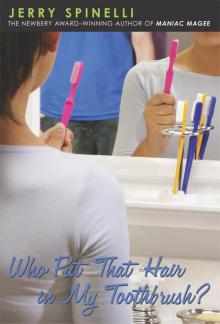 Who Put That Hair in My Toothbrush?
Who Put That Hair in My Toothbrush?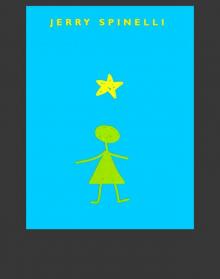 Stargirl
Stargirl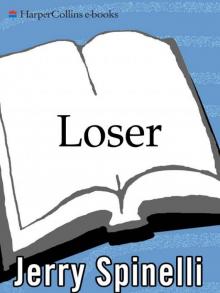 Loser
Loser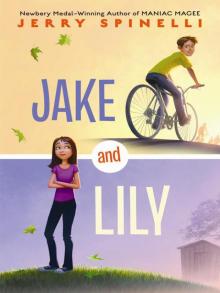 Jake and Lily
Jake and Lily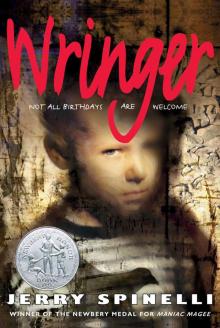 Wringer
Wringer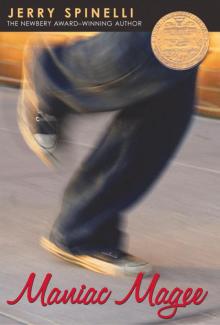 Maniac Magee
Maniac Magee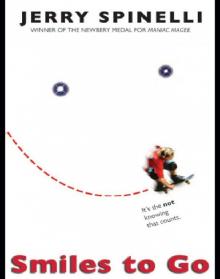 Smiles to Go
Smiles to Go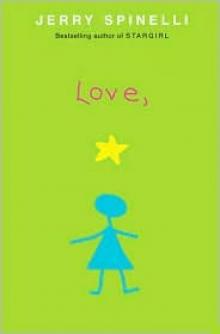 Love, Stargirl
Love, Stargirl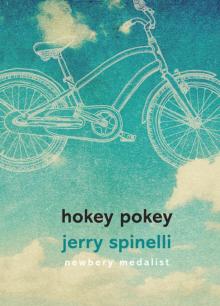 Hokey Pokey
Hokey Pokey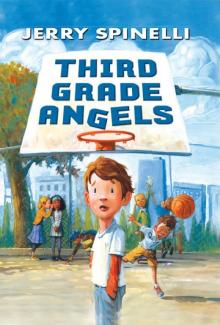 Third Grade Angels
Third Grade Angels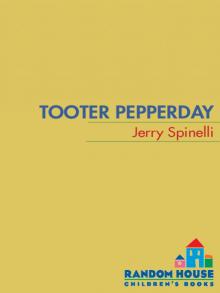 Tooter Pepperday: A Tooter Tale
Tooter Pepperday: A Tooter Tale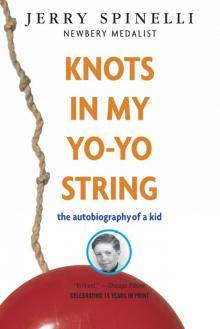 Knots in My Yo-Yo String Knots in My Yo-Yo String
Knots in My Yo-Yo String Knots in My Yo-Yo String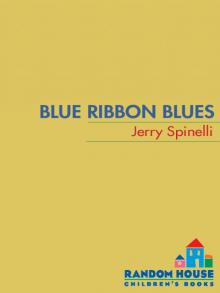 Blue Ribbon Blues: A Tooter Tale
Blue Ribbon Blues: A Tooter Tale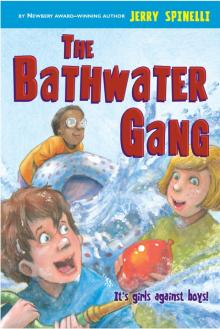 The Bathwater Gang
The Bathwater Gang Crash
Crash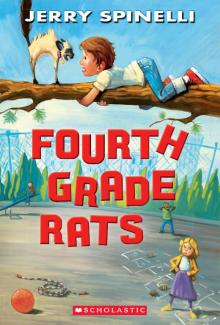 Fourth Grade Rats
Fourth Grade Rats Eggs
Eggs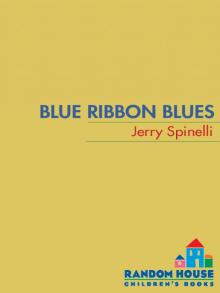 Blue Ribbon Blues
Blue Ribbon Blues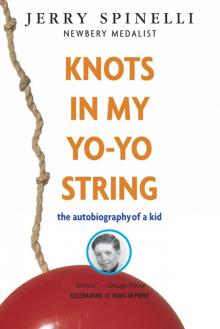 Knots in My Yo-Yo String
Knots in My Yo-Yo String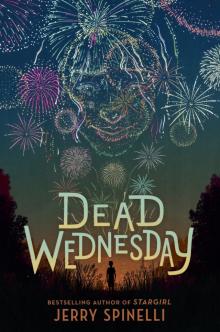 Dead Wednesday
Dead Wednesday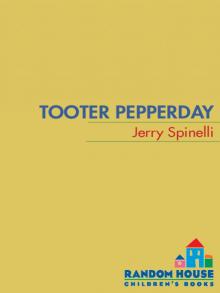 Tooter Pepperday
Tooter Pepperday